On Monday, May 8, 2023, PSC members testified in-person, pressing the Trustees and management to stop the cuts and protect all CUNY jobs, eliminate the Vacancy Review Board, and come to the table and bargain a fair contract with real raises.
Below is PSC testimony by PSC members.
Testimony from Board of Trustees Brooklyn Borough Hearing, May 8, 2023
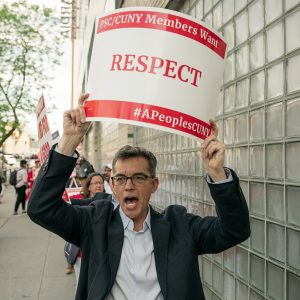
James Davis, PSC President: The Mayor’s proposed cuts total $41 million in FY2024, after the more than $18 million reduction this year. This is not ok! Chancellor Matos and Chair Thompson, you know Mayor Eric Adams a long time. What has he heard from you about student success and learning conditions at CUNY? What opposition have you raised with his budget director, Mr. Jiha, to show that investing in CUNY will yield economic dividends and other benefits for the City, while cutting CUNY means throttling the engine of mobility the city relies on? (Read James Davis’ full testimony)
Jeff Ballerini, Queensborough Community College: As we are about to conclude our second year of resumed on-campus operations, austerity continues to undermine our basic administrative functions. Our OTPS budget has been slashed repeatedly and we sometimes must wait weeks or more to receive much-needed supplies to keep the office running. Two months ago, I spent over thirty minutes using a paper cutter to convert a stack of legal paper to letter size so we could print immigration documents our international students need to conduct their affairs in the U.S. However, all this pales in comparison to the potential hardships ahead of us if the cuts sought by the board come to fruition…It doesn’t have to be this way. Instead of pushing for spending cuts, the Board must lead the charge for further investment in CUNY. (Read Jeff Ballerini’s full testimony)
Jahanzeb Ahmad, LaGuardia Community College: Some CUNY campuses have buildings that are in dire need of repair or replacement, with leaking roofs, broken windows, and outdated heating and cooling systems. I have seen through campus visits with such degrees of astonishment when I’ve walked through Hunter College’s Campus. I myself have spent time between a private institution, the Rochester Institute of Technology, and LaGuardia Community College, and the differences in attention to programs are distinctive to me. (Read Jahanzeb Ahmad’s full testimony)
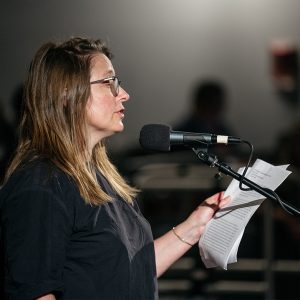
Penny Lewis, PSC Secretary: Our collective bargaining agreement expired on February 28, and CUNY administration has yet to give the PSC any dates to begin negotiations. The union has reached out multiple times since December 2022 to request dates. I am standing here with the electronic signatures of nearly 3000 of the members we represent who have written to the chancellor to say, come to the table! The delay is highly unprofessional, and, frankly, we find it deeply disrespectful that management has not placed negotiations as its highest priority.(Read Penny Lewis’ full testimony)

Kevin Adams, Medgar Evers College: Thousands of members have signed a bargaining petition. The union passed this much
needed and ambitious bargaining agenda in February. But yet, the University has not come to the table to bargain for a new contract. CUNY must set a regular schedule of bargaining sessions so that our demands are heard and met! We can speak to the demands that are most important to us, and why CUNY must begin to bargain now. (Read Kevin Adam’s full testimony)
Giacomo Bianchino, Hunter College: As for [the teachers of CUNY students], we are mostly adjunct lecturers. We make $5,500 per three-credit class. Even teaching four classes a semester, we fall far below New York’s poverty line. I’m regularly lapsing into debt to my partner, and have been forced to take out loans from CUNY when my meager pay has been delayed. To boot, graduate students like me are expected to work far beyond our paid hours, preparing for courses, grading, and advising outside of class. In our last contract, the PSC won one paid office hour, but CUNY has tried to use this negotiation to increase our workload, making composition classes previously worth four credits now worth three, which increases work for full-time faculty and reduces pay for adjuncts. (Read Giacomo Bianchino’s full testimony)
Jeanette Batiz, Bronx Community College, CLT Chapter Chair: Our colleagues have faced many injustices throughout the years, especially our CLTs and we call upon you to take a pronounced stand and position as our employer to model what it means to not follow in Wall Street executives’ behaviors to line their own pockets under the guise of upward mobility. We must all earn a living wage to be able to afford the necessities of living cost, to survive and thrive. We have a social and moral responsibility to be kind to each other, exercise dignity and practice respect. We have an ethical responsibility to our profession as educators and as agents of social change. (Read Jeanette Batiz’ full testimony)

Craig Bernardini, Chapter Chair, Hostos Community College: From understaffed offices to lost work for adjuncts to students without classes at the times they need to register, the logic of austerity impact every aspect of the college. What can the Board do right now? First, you can stop “betting against” CUNY, as a colleague of mine put it, in the form of savings plans and Vacancy Review Boards. The Vacancy Review Board should be immediately dismantled—laid to rest—ended. We need to be
increasing the number of full-time faculty, not penny-pinching for lines to remain unfilled, and more work done by adjuncts paid poverty wages. You can also come to the table and start bargaining with my union, so we can settle a contract that offers real raises, safeguards the professionalism of faculty and staff, and treats everyone in my bargaining unit with the respect
and dignity we deserve. (Read Craig Bernardini’s full testimony)
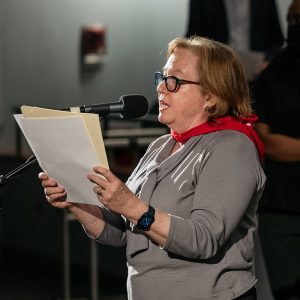
Cindy Bink, New York City College of Technology: We are asking that you please fund additional full-time mental health lines, particularly on campuses where the ratio is below one counselor to one thousand students which is recommended by the International Accreditation of Counseling Services. As the COVID-relief funds are drying up, many of our centers are losing significant staffing, making this a vital moment to invest in our work. On June 30, we will lose around 40 FTE clinicians across the CUNY Counseling Centers. This equates to not being able to serve 13,000 students who need our help. (Read Cindy Bink’s full testimony)
Katie Albany, PSC Adjunct Liaison: I’m sure CUNY wants to hire the best faculty even for part-time positions. If CUNY can’t keep up with the competition, the best qualified candidates will choose to work for SUNY instead of CUNY. This has a direct impact on the students and quality of the education they receive. (Read Katie Albany’s full testimony)
Evelyn Burg, LaGuardia Community College: CUNY’s mission is tied to the truth about what is best in the democratic faith. We cannot let the inevitable shifts in demographics, politics and lack of preparedness deflect us from a mission that represents us at our best. “Austerity” is a choice about values. Fight for CUNY funding please! (Read Evelyn Burg’s full testimony)
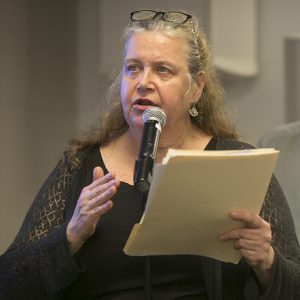
Holly Clarke, John Jay College: I have a simple suggestion: Cancel the savings plan. (Read Holly Clarke’s full testimony)

Tim Cusack, Hunter College: I am here today to stand in solidarity with my former Communications and Theatre colleagues at John Jay College for Criminal Justice. I say former because in March of this year, the faculty were informed, much to their shock and dismay, that after this current semester, their department was to be eliminated. Seasoned teachers with decades-long experience were to be summarily tossed into the street, even those who had attained multi-year contracts. (Read Tim Cusack’s full testimony)
Scott Ethier, LaGuardia Community College: Mayor Fiorello H. LaGuardia set the standard for a life of public service in New York City. In 1943 Mayor LaGuardia did something that today would be unthinkable today: he founded an opera company, New York City Opera – “The People’s Opera.”He founded an opera company because he understood that the people of New York are more than units of economic productivity. They are human beings with souls that must be nourished, and it is the duty of government to ensure that art is accessible to all. If Mayor LaGuardia could start an opera company in the darkest days of World War II, I call on CUNY’s Board of Trustees not to give in to austerity, but to fight for an abundantly funded CUNY. (Read Scott Ethier’s full testimony)
Hugo Fernandez, LaGuardia Community College: For decades, [adjuncts] carried this institution on their backs, helping students to afford a good low-cost education. Now we turn our backs on these colleagues, dismissing them at a time when it is financially inconvenient to keep them. My own personal goal would be to reduce the number of part-time faculty by hiring them as full-timers. I believe this is possible through slow attrition as existing full-time staff retire, and/or folks move on. Just letting them go, showing no loyalty or thanks, would create a shadow on this institution that I would not want to live under, and I hope you feel the same way. (Read Hugo Fernandez’ full testimony)

Jillian Abbott, York College: In the past, real learning took place at CUNY, providing the city with a solid foundation of highly trained, upwardly mobile workers needed to drive recovery. Nowadays, CUNY seems to see the bulk of students as a revenue stream, they aren’t expected to graduate, and currently 70 percent drop out. Thus, CUNY sees no need to pay teachers a living wage…But it can change. You can change it. Adjuncts with three-year contracts went through rigorous selection processes. Give us a living wage and job security, smaller classes, and we can combat the fragility of today’s learning environment and fill in the foundation of knowledge on which the city’s future success stands. (Read Jillian Abbott’s full testimony)

Stuart Davis, Baruch Chapter Chair: I’m inspired by the CUNY students on my campus and across the system who are tabling on campus, protesting in Baruch’s main plaza, and leading marches across the Brooklyn Bridge to fight for better funding for our university. To all members of the Board of Trustees: If the students can fight, why can’t you? (Read Stuart Davis’ full testimony)
Evelyn Rich Jones, Retiree: …We all know that education is the key to social and economic mobility. CUNY is not only an educational institution. It is an effective poverty program and an economic development engine. Investment here will pay off in the future as we continue the task of building a better CUNY which better meets the needs of its students and the City in which they reside. (Read Evelyn Rich Jones’ full testimony)
Jayashree Kamble, LaGuardia Community College: This city runs because of CUNY graduates. I urge you to work collectively with us to help them, help ourselves, and dare I say, help the country, for whom we are the engine. Be our allies against tuition increases and outdated infrastructure that different administrations prefer to overlook and against attacks on academic freedom that we must repel if we are truly to remain a university. We—students, staff, and faculty—are counting on you. (Read Jayashree Kamble’s full testimony)
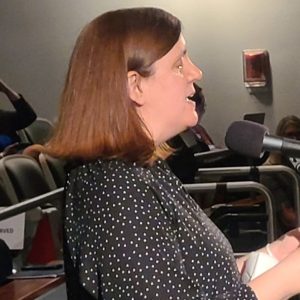
Jessica DeCoux, New York City College of Technology: This situation is cruel, ineffective, and unsustainable. How absurd that this is the baseline we are begging you to maintain. How absurd that we must waste our finite energy supplicating ourselves to avoid these disastrous cuts, when the “victory” we gain by avoiding them is the right to return to austerity, precarity, and expendability as usual. (Read Jessica DeCoux ‘s full testimony)
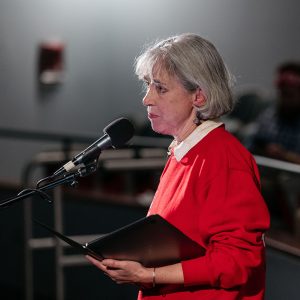
Elizbeth Hovey, John Jay College: Trustees’ past choices cause the needless suspension of theater classes at John Jay College this coming fall. Many dedicated, experienced adjuncts who have too little job security have been harmed by the stress of anticipating next Monday’s notification. Are they reappointed or candidates for unemployment insurance? This treatment is harmful for all. (Read Elizabeth Hovey’s full testimony)
Jack Kenigsberg, Hunter: I read every word my students write, and I give them the feedback they need to improve. All the adjuncts who teach composition do this…I engage with their ideas and take them seriously as writers and as thinkers…We are among the very first faculty members students meet. We are their first impression of CUNY. Shouldn’t their first impression be as positive as possible?…When you let adjuncts go for cost-cutting purposes, class sizes grow. When class sizes grow, it becomes that much more difficult to provide a quality education, to give effective feedback, and to form the kinds of interpersonal connections with students that make students feel at home at CUNY. (Read Jack Kenigsberg’s full testimony)
Kevin Kolack, Queensborough Community College: The front-line essential workers of CUNY need your help. We need you to appreciate the ways in which strained faculty are rising to meet the additional learning challenges of pandemic-impacted students. We need you to see that we are stretched thin. And we need your advocacy to fully staff our departments so that we can continue to help our students succeed in community college and in life. (Read Kevin Kolack’s full testimony)
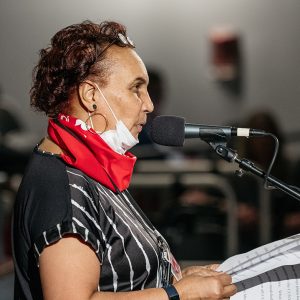
Maudry-Beverley Lashley, Medgar Evers College Chapter Chair: This fiscal crisis was eminently predictable. Considering this, how could you, as the governing body for CUNY, allow the astronomical executive raises in November 2022? To cite two instances of a 27% and a 30%? increase. Are you projecting that CUNY will experience a tsunami of monies? Then we insist that the Chancellor come to the PSC-CUNY Bargaining table and spread some of that wealth! (Read Maudry-Beverley Lashley’s full testimony)

Karen Miller, LaGuardia Community College: We need to keep funding classes that our students can succeed in. Students simply do not get enough attention without the care that faculty can take in a smaller classroom. Since the pandemic, enrollment has fallen, but the numbers of contingent faculty have fallen proportionately further. The jobs of my colleagues on three-year contracts are disappearing in the face of austerity, but these most-exploited faculty make our institutions work. CUNY is working to pressure to lay off part-time faculty, cut our budgets, and fill our classes to their limits. Actions that clearly undermine education. We are an educational institution. Our students need to be our priority. (Read Karen Miller’s full testimony)
Elizabeth Marcello, Hunter: CUNY relies heavily on exploited adjunct labor. In addition to abysmal job security, adjuncts like myself juggle big class sizes, dedicate unpaid hours to advising students, and are rewarded with inadequate pay. For two years I taught a class of 50 students. I spent countless unpaid hours on class prep, student advising, and grading. I tried my best to balance a full time job with obligations to my students. I would have liked to spend more time working with my students. Toward this end, CUNY should be offering full-time faculty positions to more of its dedicated adjuncts, not laying them off and implementing university-wide hiring freezes. (Read Elizabeth Marcello’s full testimony)
Lynne Turner, PSC-CUNY Vice-President for Part-time Personnel: Be bold. Reject the austerity cuts. No layoffs, no loss of health insurance, no increased workload, and no increased class size. No more missing adjuncts, missing advisors, missing full-time faculty positions and more. Our students deserve more. Fulfill your mandate to protect and preserve the historic mission of CUNY to serve the working class communities of New York City. (Read Lynne Turner’s full testimony)
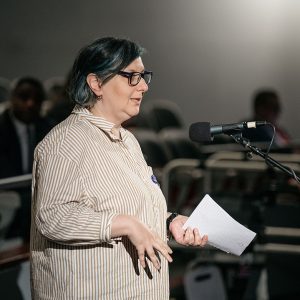
Jasmina Sinanović, City College of New York: At the end of Spring 2020 BCC laid me off. As I qualified for 3 year contract I was too expensive for them, as an adjunct I was expendable. In the middle of the pandemic I was to be left without health insurance. Thanks to CCNY I did not but many of my colleagues did. It is now May again and we are threatened again. How are we to support our students when we are not supported? How are we to focus on teaching when we are repeatedly threatened? I am here to ask you to advocate for us, to use your voices to amplify ours. It is your job to represent us. It is your job to use your proximity to power to advocate for those further away. (Read Jasmina Sinanović’s full testimony)
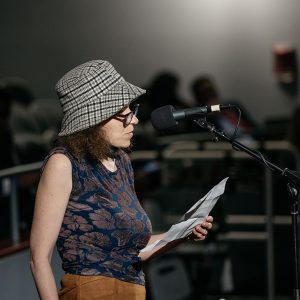
Laura Tanenbaum, Vice Chair, LaGuardia Community College: Too many of our students have been ill-served by various institutions and services in a city that has become increasingly difficult to live in for all but the wealthiest. (Which includes almost none of the faculty and staff working here)…As an open admissions school, LaGuardia and our fellow community colleges are those rare places that take students where they are, which can mean offering childcare, a food panty, and immigration help along with the academic resources of a world class university. None of this is possible with the preemptive cuts this board has called for, at a time when need has never been higher. (Read Laura Tanenbaum’s full testimony)
Cheryl Morrison, York College: The heavy lifting is most definitely left to the front facing service areas. The Admissions, the Financial Aid, the Bursars, the health office, the registrar office are the students decision makers. I believe these offices should be considered with high regards to each college’s numbers and revenue. The front facing offices as we are called at York suffers with staffing always. These offices are strong contributors and yet we remain under staffed and poorly equipped. (Read Cheryl Morrison’s full testimony)
Naomi Schiller, Brooklyn College and CUNY Graduate Center: I shared with [my student] that you, the CUNY Board of Trustees announced 100 million dollars more in cuts to CUNY for 2024. She responded: “I guess they just don’t care about us, but honestly, it doesn’t surprise me.” Her disappointment was palpable, but she has come to expect neglect. I am here tonight to demand that you surprise us. Surprise us by understanding that there is nothing left to cut. Surprise us by making budget requests to the State and City that accurately reflect our needs. Surprise us by coming to the bargaining table tomorrow. Surprise us by taking some risks to for CUNY. (Read Naomi Schiller’s full testimony)
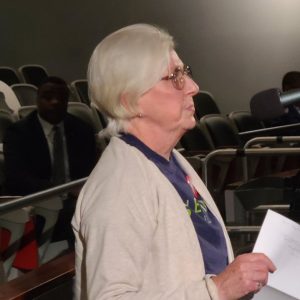
Ruth Wangerin, Lehman College: Time to get straight to the point. CUNY central has told the colleges to cut back on spending, and particularly to cut back on their “adjunct budgets.” What say you, ChatGPT? “Laying off the lowest paid, most productive workers may save money in the short term, but in the long run, it can turn out to be penny wise and pound foolish. Here’s why: It can lead to a loss of productivity, increased costs for hiring and training new employees, decreased morale among remaining staff, damage to the organization’s reputation, and missed opportunities for innovation and growth. So, while it may seem like a cost-saving move initially, it can end up being a costly decision overall.” (Read Ruth Wangerin’s full testimony)
Published: May 8, 2023 | Last Modified: May 14, 2023

